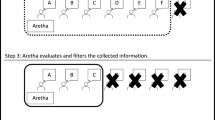Abstract
We examine the possibility of Arrovian social choice when alternatives consist of outcomes and opportunity sets from which they are chosen. Consequentialism is a choice attitude towards outcomes and opportunities for choice and prioritizes outcomes rather than opportunities for choice. We first propose a sufficient condition for a restricted domain on which Arrow’s impossibility theorem holds. A domain such that there exists a similarity of choice attitudes within consequentialism satisfies the proposed domain condition. We observe that a diversity of choice attitudes within consequentialism is crucial to resolve an Arrovian impossibility, but this resolution is restricted in plausibility.
Similar content being viewed by others
References
Arrow KJ (1963) Social choice and individual values, 2nd edn. Wiley, New York
Baharad E, Nitzan S (2000) Extended preferences and freedom of choice. Soc Choice Welfare 17: 629–637
Bordes G, Hammond P, Le Breton M (2005) Social welfare functionals on restricted domains and in economic environments. J Public Econ Theory 7: 1–25
Bordes G, Le Breton M (1989) Arrovian theorems with private alternatives domains and selfish individuals. J Econ Theory 47: 257–281
Bordes G, Le Breton M (1990) Arrovian theorems for economic domains. The case where there are simultaneously private and public goods. Soc Choice Welfare 7: 1–17
Gravel N (1994) Can a ranking opportunity sets attach an intrinsic importance to freedom of choice?. Am Econ Rev Pap Proc 84: 454–458
Gravel N (1998) Ranking opportunity sets on the basis of their freedom of choice and their ability to satisfy preferences: a difficulty. Soc Choice Welfare 15: 371–382
Iwata Y (2007) A variant of non-consequentialism and its characterization. Math Soc Sci 53: 284–295
Iwata Y (2008) Essays on consequences, opportunities, and social welfare. PhD dissertation, Hitotsubashi University
Kalai E, Muller E (1977) Characterization of domains admitting non-dictatorial social welfare functions and non-manipulable voting procedures. J Econ Theory 16: 457–469
Kalai E, Muller E, Satterthwaite MA (1979) Social welfare functions when preferences are convex, strictly monotonic, and continuous. Public Choice 34: 87–97
Kelly JS (1994) The Bordes-LeBreton exceptional case. Soc Choice Welfare 11: 273–281
Le Breton M, Weymark JA (2005) Arrovian social choice theory on economic domains. In: Arrow KJ, Sen AK, Suzumura K (eds) Handbook of social choice and welfare, vol 2, North-Holland, Amsterdam (forthcoming)
Ozdemir U, Sanver MR (2007) Dictatorial domains in preference aggregation. Soc Choice Welfare 28: 61–76
Sakai T, Shimoji M (2006) Dichotomous preferences and the possibility of Arrovian social choice. Soc Choice Welfare 26: 435–445
Sen AK (1985) Commodities and capabilities. North-Holland, Amsterdam
Sen AK (1988) Freedom of choice: concept and content. Euro Econ Rev 32: 269–294
Suzumura K, Xu Y (2001) Characterizations of consequentialism and non-consequentialism. J Econ Theory 101: 423–436
Suzumura K, Xu Y (2003) Consequences, opportunities, and generalized consequentialism and non-consequentialism. J Econ Theory 111: 293–304
Suzumura K, Xu Y (2004) Welfarist-consequentialism, similarity of attitudes, and Arrow’s general impossibility theorem. Soc Choice Welfare 22: 237–251
Suzumura K, Xu Y (2006) Consequentialism and non-consequentialism: the axiomatic approach. Discussion paper, Hitotsubashi University
Author information
Authors and Affiliations
Corresponding author
Rights and permissions
About this article
Cite this article
Iwata, Y. Consequences, opportunities, and Arrovian impossibility theorems with consequentialist domains. Soc Choice Welf 32, 513–531 (2009). https://doi.org/10.1007/s00355-008-0338-4
Received:
Accepted:
Published:
Issue Date:
DOI: https://doi.org/10.1007/s00355-008-0338-4




